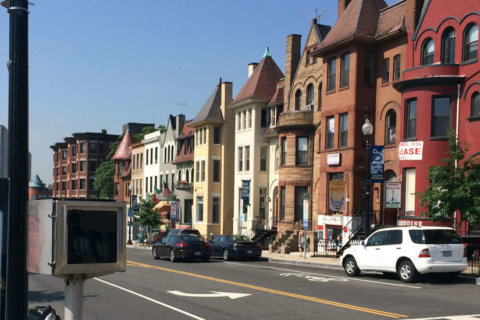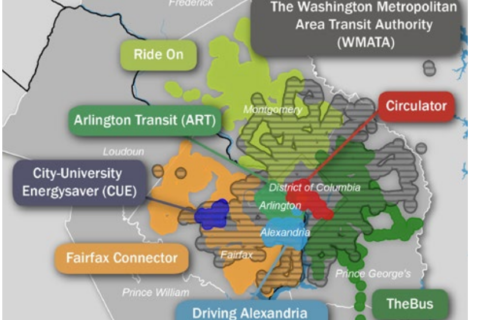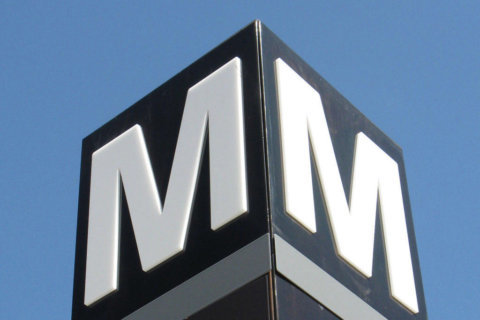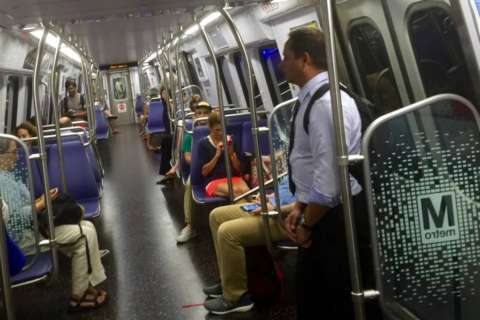WASHINGTON — D.C.-area buses are going 9 percent more slowly and are carrying fewer riders than just a few years ago. Now, the outlines of a major overhaul are expected by April.
The plan would have major impacts on people who have built their lives around existing bus routes, and would aim to draw new riders by speeding up buses and providing better service, with the earliest and simplest changes beginning in July 2020.
Crucial parts of the plan are out of Metro’s hands, though, including win-win ideas such as dedicated bus lanes across the region that would be the responsibility of local transportation departments.
Bus lanes would not only increase bus speeds and therefore increase ridership on the improved services, but would also cut costs significantly.
Speeding up buses by just 1 mph, to return to 2007 speeds, would mean a savings equivalent to 4 percent of operating costs, the Bus Transformation Project team has found. Metro could also save several million dollars by cutting the amount of time buses are going to or from the end of a route out of service, without passengers.
With any improvements, though, some or many current routes could be changed, as happened during major overhauls in other cities such as Baltimore.
“We are now moving into the second phase where we’re starting to make harder choices,” Eno Center for Transportation CEO Rob Puentes said.
Puentes is chairing the Bus Transformation Project’s Executive Steering Committee, which will move to more specific recommendations by fall after public feedback this spring on draft plans set to be released as soon as mid-March.
“If we can develop a cohesive, bold regional strategy, that’s a win,” Puentes said.
Arlington’s Christian Dorsey expressed concerns that the region may not be able to make the bus the best way to get around outside of rush hours, so the focus should be on rush hour for now.
The project is being run by Metro, but considers the other major bus services in the region — Fairfax Connector, RideOn, TheBus, CUE, DASH and ART.
Rider surveys show bus riders simply want more frequent, reliable service, and when routes don’t run frequently enough or often get stuck in traffic, people choose other ways to get around or skip trips entirely. More than 80 percent of Metrobus trips do not connect to the rail system. About half of Metrobus riders make less than $30,000 per year.
“The idea is for more bus, not less … it does have a strong role to play,” Puentes said. “This process has to do no harm to the folks who depend on it and, probably should be augmenting the service that they have.”
Metro General Manager Paul Wiedefeld expects to include at least some of the changes proposed in the plan in the budget he will propose next fall, meaning those changes would actually begin July 1, 2020.
The plan faces financial challenges though, since Metro faces a legally mandated 3 percent cap on subsidy increases, even if higher subsidies made it cheaper to operate the separately funded road systems.
Wiedefeld hopes the plan becomes one where the region has made decisions that Metro simply aims to implement.
“As you get further into the details, these things get tougher and tougher,” Wiedefeld said.
Metro’s Bus Transformation Project team is meeting with city and county elected leaders this week, and plans to talk with local members of Congress soon.
Metro Board Chairman Jack Evans, a D.C. Councilmember, said he would love to see dedicated bus lanes across the region, including throughout the District.
“It would require an enormous sea change in the attitude of the region,” Evans said. “But we cannot in my view continue along the path we are with this bus system.”
The review is considering local bus routes in all of the cities and counties served by Metro, plus Loudoun County, which will have Metro service when the Silver Line opens in 2020.
The numerous jurisdictions involved makes changes in the D.C. area even more complicated than other parts of the country, Puentes said.
Rich Davey, a consultant working on the project, said it is considering what a changing future will look like over 1-, 3-, 5- and 10-year plans as autonomous cars, shuttles or other technology could expand.
The project is not considering flying cars, though, he told federal Metro Board Member David Horner.
Horner asked whether Metro had the legal authority to operate “municipal air service.” A Metro attorney confirmed the agency would today have the legal authority to operate such service, if it chose.








